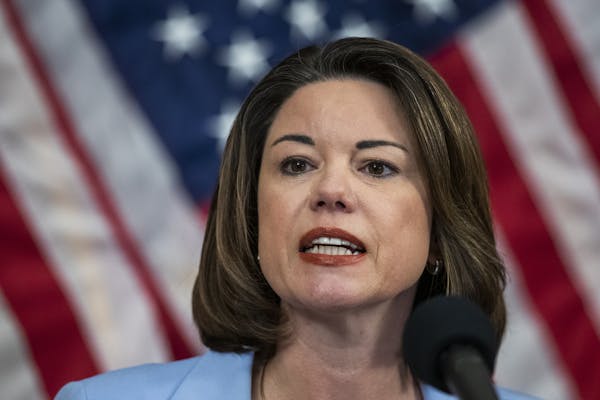A looming court decision about the timing of Minnesota's Second Congressional District election — in November or February — could have significant political implications for the hotly contested race between Democratic U.S. Rep. Angie Craig and Republican challenger Tyler Kistner.
After Legal Marijuana Now Party candidate Adam Weeks' death last month, Minnesota Secretary of State Steve Simon said state law requires the race be pushed back from Nov. 3 to a special election on Feb. 9. Craig has sued Simon, arguing the race should not be postponed.
A delay could introduce a new set of factors, potentially making this the first election to be held in the aftermath of the presidential race.
"It's going to be probably the single most intense congressional race you've ever had in this state," former DFL political operative Todd Rapp said of the potential special election.
The "wild card" is whether frustration over the November outcome spurs higher voter turnout in February, he said, which could benefit the party that loses the presidential race.
A February election would give Kistner, who has not held public office before, additional time to connect with voters. The national spotlight also could help boost his name recognition. Both he and Craig continue to campaign in the district that includes south metro suburbs and part of rural southeastern Minnesota.
"This is definitely helping raise the name identification for us, but it is sad that we are benefiting from something so tragic," Kistner said last week.
Kistner opposes Craig's effort to block the delay, asking U.S. District Court Judge Wilhelmina Wright to dismiss Craig's case.
Craig's campaign spokesman David McGonigal said the lawsuit stems from concerns that the district would be temporarily left without a voice in Washington after her term ends in January.
"It's too early to speculate" about political impacts of the election's timing, he said, "At this point Angie is not focused on the politics of this; she is focused on working for the people of the district."
Trump narrowly carried the Second District in 2016. Former U.S. Rep. Jason Lewis, an ardent Trump supporter, beat Craig that year.
But she won their rematch two years later, and the Cook Political Report rates the 2020 race as "leans Democratic."
Lewis's decision to forgo another rematch and run for the U.S. Senate instead could be a signal that Craig — and likely Democratic presidential candidate Joe Biden — are poised to do well in the Second District this election, said St. Olaf College political science professor Dan Hofrenning.
"Angie Craig is ahead right now, so she would like to have an election and be declared a victor," said Hofrenning, who recently moved after 30 years in the Second District. "I think in a February race Angie Craig would still be favored, but it obviously introduces two months of uncertainty into the race."
Craig headed into the home stretch of the election season with significantly more money in her war chest. As of the latest reporting deadline in July, she had $2.6 million in cash on hand. Kistner had almost $488,000.
The campaigns must decide whether to hold off on spending or ads as they wait on the court decision. The judge will weigh whether the state should comply with the special election requirement set by the Minnesota Legislature.
Craig contends the state law is pre-empted by federal law that says voters will choose representatives in November.
"Our stance is that this election is going to take place in November and we're going to use our resources and campaign as if that is the case," McGonigal said, noting that Craig released a new TV ad last week. He said he hasn't been a part of discussions about a secondary plan to retool the campaign for a special election.
Meanwhile, Dennis Schuller, of the Legal Marijuana Now Party, called Craig's suit a "shortsighted effort for attention and nothing more than an attempt to marginalize third parties." He contended the law is clear that there should be a special election.
Republicans have historically fared better in special elections in Minnesota. Republican or Independent Republican candidates for the state Legislature won 61 of the past 100 legislative special elections, Legislative Reference Library data show.
If there is a special election, it will land in the national spotlight and draw more financial resources and press attention, said Matt Pagano, a Republican strategist who is an adviser to Kistner's campaign. He said people will treat it as a referendum on the outcome of the presidential election in November.
"A danger for both sides is fatigue. We're going though a gargantuan presidential election right now, so the question is whose base bounces back better?" Pagano said. "Whose base is more motivated to go out and vote again?"
A special election would have much lower turnout than November, said Jeff Schuette, chairman for the Second District Republicans. He likened it to a primary race.
"We know exactly who to call and get people out, so it might be a little easier to have it in February," Schuette said. Republican Party volunteers who are working on other contests in November could focus their energy on one race, he noted.
However, Rapp said it appears Democrats are doing a better job of using mail-in voting, which could benefit them in a February election — particularly in the event of a voting-day blizzard.
Jessie Van Berkel • 651-925-5044
Former DFL Senate Majority Leader Kari Dziedzic dies of cancer at age 62

How the Star Tribune is covering the 2024 election

Fact check: Walz and Vance made questionable claims during only VP debate

In Tim Walz's home city, opposing groups watch him debate on the national stage

